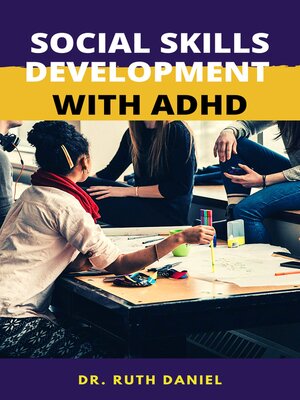Social Skills Development with ADHD
ebook ∣ Social skills training helps the child or adult who has attention deficit hyperactivity disorder (ADHD) be less ... and behave in a more socially acceptable way.
By Dr. Ruth Daniel

Sign up to save your library
With an OverDrive account, you can save your favorite libraries for at-a-glance information about availability. Find out more about OverDrive accounts.
Find this title in Libby, the library reading app by OverDrive.



Search for a digital library with this title
Title found at these libraries:
| Library Name | Distance |
|---|---|
| Loading... |
Individuals with ADHD exhibit behavior that is often seen as impulsive, disorganized, aggressive, overly sensitive, intense, emotional, or disruptive. Their social interactions with others in their social environment — parents, siblings, teachers, friends, co-workers, spouses/partners — are often filled with misunderstanding and mis-communication.
Those with ADHD have a decreased ability to self-regulate their actions and reactions toward others. This can cause relationships to be overly tense and fragile.
This book address some of the particular relationship issues faced by individuals with ADHD and others in their lives.
Individuals with ADHD often experience social difficulties, social rejection, and interpersonal relationship problems as a result of their inattention, impulsivity and hyperactivity. Such negative interpersonal outcomes cause emotional pain and suffering. They also appear to contribute to the development of co-morbid mood and anxiety disorders.
It is not difficult to understand the reasons why individuals with ADHD often struggle in social situations. Interacting successfully with peers and significant adults is one of the most important aspects of a child's development, yet 50 to 60 percent of children with ADHD have difficulty with peer relationships. Over 25 percent of Americans experience chronic loneliness. One can only speculate that the figure is much higher for adults with ADHD.
To interact effectively with others, an individual must be attentive, responsible and able to control impulsive behaviors. Adults with ADHD are often inattentive and forgetful and typically lack impulse control. Because ADHD is an "invisible disability," often unrecognized by those who may be unfamiliar with the disorder, socially inappropriate behaviors that are the result of ADHD symptoms are often attributed to other causes. That is, people often perceive these behaviors and the individual who commits them as rude, self-centered, irresponsible, lazy, ill-mannered, and a host of other negative personality attributes. Over time, such negative labels lead to social rejection of the individual with ADHD. Social rejection causes emotional pain in the lives of many of the children and adults who have ADHD and can create havoc and lower self-esteem throughout the life span. In relationships and marriages, the inappropriate social behavior may anger the partner or spouse without ADHD, who may eventually "burn out" and give up on the relationship or marriage.
Educating individuals with ADHD, their significant others, and their friends about ADHD and the ways in which it affects social skills and interpersonal behaviors can help alleviate much of the conflict and blame. At the same time, the individual with ADHD needs to learn strategies to become as proficient as possible in the area of social skills. With proper assessment, treatment and education, individuals with ADHD can learn to interact with others effectively in a way that enhances their
social life.
GRAB A COPY TODAY TO LEARN MORE







